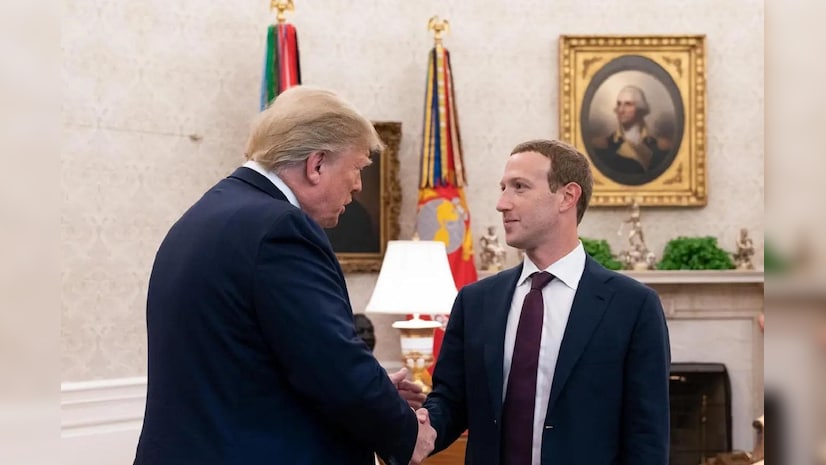The Zuckerberg-Trump Dynamic: Implications For Facebook And Beyond

Table of Contents
Trump's Use of Facebook and its Impact
Amplifying the Trump Message
Facebook's algorithm, initially, heavily favored Trump's populist messaging, leading to unprecedented reach and engagement. This amplified his voice and allowed him to connect directly with millions of supporters, bypassing traditional media gatekeepers.
- Organic reach: Trump's posts consistently achieved exceptionally high organic reach, meaning more people saw his content without paid advertising.
- Paid advertising effectiveness: His campaign effectively utilized targeted advertising on Facebook, reaching specific demographics with tailored messages.
- Targeted advertising strategies: Sophisticated targeting allowed for micro-segmentation of voters, leading to highly effective campaigning.
- The role of Facebook groups in mobilizing support: Pro-Trump Facebook groups became hubs for organizing rallies, spreading information (and misinformation), and mobilizing voters.
The 2016 Election and Foreign Interference
The role of Facebook in the 2016 US Presidential election became a focal point, with concerns over Russian interference and the spread of disinformation campaigns significantly impacting the election results.
- Cambridge Analytica scandal: The misuse of user data by Cambridge Analytica to target voters raised serious concerns about data privacy and the influence of political consulting firms.
- Russian troll farm activity: Russian-backed troll farms exploited Facebook's advertising platform to spread divisive content and influence public opinion.
- Impact on voter sentiment: The spread of fake news and propaganda through Facebook significantly affected voter sentiment and contributed to the polarized political climate.
- The limitations of Facebook's fact-checking efforts: Facebook's initial fact-checking efforts proved insufficient to counter the scale and sophistication of disinformation campaigns.
Facebook's Response to Trump's Controversial Statements
Facebook faced immense pressure to moderate Trump's content, particularly concerning inflammatory rhetoric and misinformation, forcing a constant evolution of its content moderation policies.
- Balancing free speech vs. harmful content: Facebook struggled to find a balance between upholding free speech principles and preventing the spread of harmful content.
- Evolving content moderation policies: The platform's content moderation policies underwent significant changes in response to criticism and evolving concerns.
- Criticism for inconsistent enforcement: Facebook faced criticism for inconsistent enforcement of its policies, leading to accusations of bias.
- The impact of these policies on user trust: The perceived inconsistencies eroded user trust in Facebook's ability to maintain a safe and reliable platform.
The Shifting Power Dynamic
Zuckerberg's initial reluctance to intervene
Zuckerberg initially adopted a hands-off approach, emphasizing free speech principles and fearing accusations of bias against conservative voices.
- Arguments for minimal intervention: Facebook argued that intervening in political discourse would be a dangerous precedent, potentially stifling free speech.
- Concerns about bias accusations: The fear of accusations of political bias heavily influenced Facebook's initial reluctance to moderate Trump's content.
- The challenges of content moderation at scale: Moderating content at the scale of Facebook presented immense logistical and technical challenges.
Growing pressure and policy changes
Faced with mounting criticism and the growing awareness of the dangers of misinformation, Facebook gradually implemented stricter content moderation policies.
- Bans on political advertising: Facebook introduced restrictions on political advertising to limit the spread of misleading information.
- Stricter fact-checking measures: The platform enhanced its fact-checking partnerships and implemented stricter measures to identify and flag false information.
- Changes to algorithms: Facebook adjusted its algorithms to reduce the visibility of divisive and misleading content.
- Impact on political campaigns: These policy changes significantly impacted the ability of political campaigns to reach voters through Facebook.
The January 6th Capitol Riot and its aftermath
The events surrounding the January 6th riot forced Facebook to take more decisive action, culminating in Trump's indefinite suspension from the platform.
- The justification for the ban: Facebook justified the ban on the grounds that Trump's rhetoric incited violence and posed a threat to public safety.
- The debate surrounding censorship: Trump's ban ignited a fierce debate about censorship, freedom of speech, and the power of social media platforms.
- The legal challenges: The ban faced legal challenges, raising questions about the scope of platform power and accountability.
- Long-term implications for political discourse: The aftermath of the ban continues to shape the debate on the role of social media in political discourse.
Broader Implications for Social Media Regulation
The Debate on Section 230
The Zuckerberg-Trump dynamic has intensified the debate surrounding Section 230 of the Communications Decency Act, highlighting the need for clearer legal frameworks governing online content.
- Arguments for and against reform: The debate centers on whether Section 230 provides excessive protection to social media platforms or is crucial for protecting free speech.
- The potential impact on platform accountability: Reform could increase platform accountability for harmful content but could also stifle innovation and free expression.
- Concerns about censorship and free speech: Balancing platform accountability with the protection of free speech remains a central challenge.
Global Implications for Content Moderation
The experiences of Facebook in navigating the Zuckerberg-Trump relationship have significant implications for content moderation practices worldwide.
- International regulations: Different countries have varying approaches to content moderation, creating challenges for global platforms.
- Cross-cultural differences in acceptable speech: What constitutes acceptable speech varies significantly across cultures, making consistent enforcement difficult.
- The challenges of consistent enforcement across diverse contexts: Facebook faces the challenge of applying consistent content moderation standards across vastly different cultural and legal contexts.
The Future of Social Media and Political Discourse
The relationship between technology companies and political leaders continues to evolve, requiring ongoing scrutiny and adaptation to ensure responsible use of social media platforms.
- The role of AI in content moderation: Artificial intelligence plays an increasingly crucial role in content moderation, but ethical concerns remain.
- The need for greater transparency: Increased transparency in platform algorithms and content moderation practices is crucial for building trust.
- The importance of media literacy education: Empowering individuals with critical thinking skills and media literacy is essential for navigating the complex information landscape.
Conclusion
The complex interplay between Mark Zuckerberg and Donald Trump has significantly impacted Facebook's trajectory and redefined the relationship between social media platforms and politics. This dynamic highlights the immense challenges of balancing free speech with the need to combat misinformation and harmful content. The long-term implications for social media regulation, political discourse, and the future of online interaction remain significant. Understanding the Zuckerberg-Trump dynamic is crucial for navigating the evolving landscape of social media and its influence on our world. Further research into the Zuckerberg-Trump dynamic and its impact on future elections and political engagement is essential to ensure a healthier and more responsible digital environment.

Featured Posts
-
 Christmas Voucher Failure Sony Issues Play Station Credit Compensation
May 03, 2025
Christmas Voucher Failure Sony Issues Play Station Credit Compensation
May 03, 2025 -
 Is Sabrina Carpenter Coming To Fortnite Official Release Info
May 03, 2025
Is Sabrina Carpenter Coming To Fortnite Official Release Info
May 03, 2025 -
 Celebrity Traitors On Bbc Famous Siblings Pull Out Throwing Filming Into Disarray
May 03, 2025
Celebrity Traitors On Bbc Famous Siblings Pull Out Throwing Filming Into Disarray
May 03, 2025 -
 Farage Faces Backlash From Teaching Union Over Far Right Claim
May 03, 2025
Farage Faces Backlash From Teaching Union Over Far Right Claim
May 03, 2025 -
 Saudi Arabias Revised Abs Regulations A Market Shifting Development
May 03, 2025
Saudi Arabias Revised Abs Regulations A Market Shifting Development
May 03, 2025
